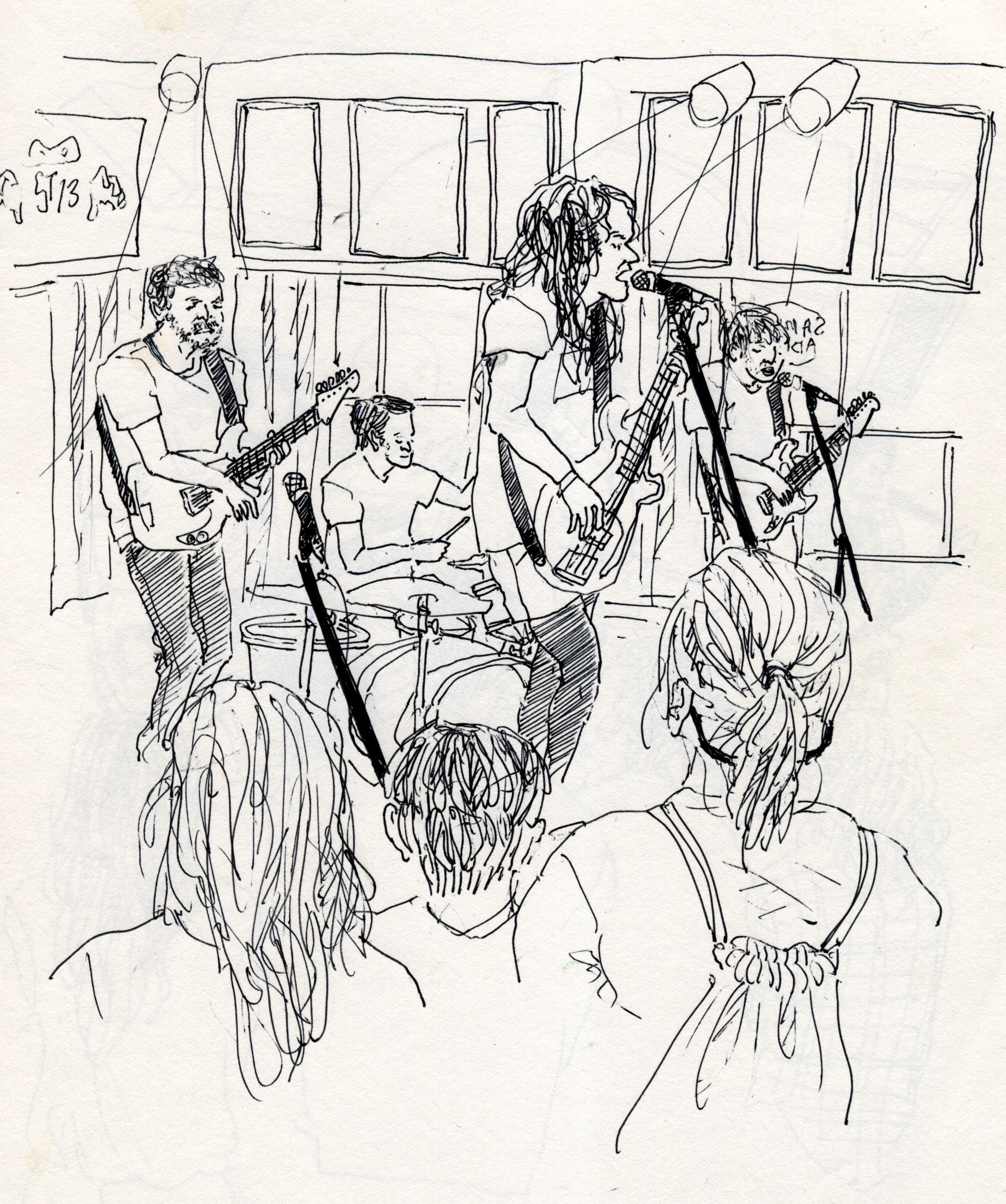
The Hotelier at FEST 13 at Loosey’s in Gainesville, FL, 11/2/14
If there’s any accurate word to describe an audience at a Hotelier show, it’s genuine. And on a chilly, early April evening, a small, college-aged Boston audience upheld this tradition.
Sounding rough and raspy due to a cold, and probably New England’s flippin’ insane pollen levels, lead vocalist Christian Holden gave a subdued, but wholehearted effort. Bandmates Sam Frederick, Chris Hoffman and new touring guitarist Jade DiMitri, along with committed voices from the crowd made up for the rest– even on songs from the band’s previously unreleased record. The whole experience was so candid, and so uniquely Hotelier.
It’s this attitude that makes Goodness one of the most highly anticipated pop punk/emo records since, like, 2007. The album, which officially releases today via Tiny Engines, has been described as the Hotelier’s first love album, a total shift in the band’s trajectory. And to an extent, it seems like these claims are true. But, to Holden, it’s not that simple. These aren’t carelessly drafted love songs, as is the tendency in the pop punk and emo genre. Their intentions are progressive and productive, a love narrative that you can hold up to feminist critique, that hasn’t been overdone.
To do this, the love songs on Goodness look at love a little differently. From taking notes on self-identified anarcho-primitivist philosopher John Zerzan’s zine “Totality and Tonality,” (about how fascism dicates tone in western music) to seeing things from a happy nihilist’s point of view, lyricist Holden upholds claims that this new album is different, naturalist, and divisive.
The title track itself– a soft but boldly spoken poem– is an immediate immersion into the Hotelier’s new soundscape. It’s vulnerable, but confident. And this newfound softness touches every part of the Worcester band’s third LP, from beginning, middle, to end. And it works because Goodness, more than any other Hotelier record, is a story. Or maybe it’s more like an explanation. Each song, much like the band’s bassist and lead vocalist, is both wordy and stoic; taking their time, having intention.
In a sterile, nearly empty Northeastern University classroom, I talked to Holden about these intentions, inclusivity and why Goodness happened for good reason.
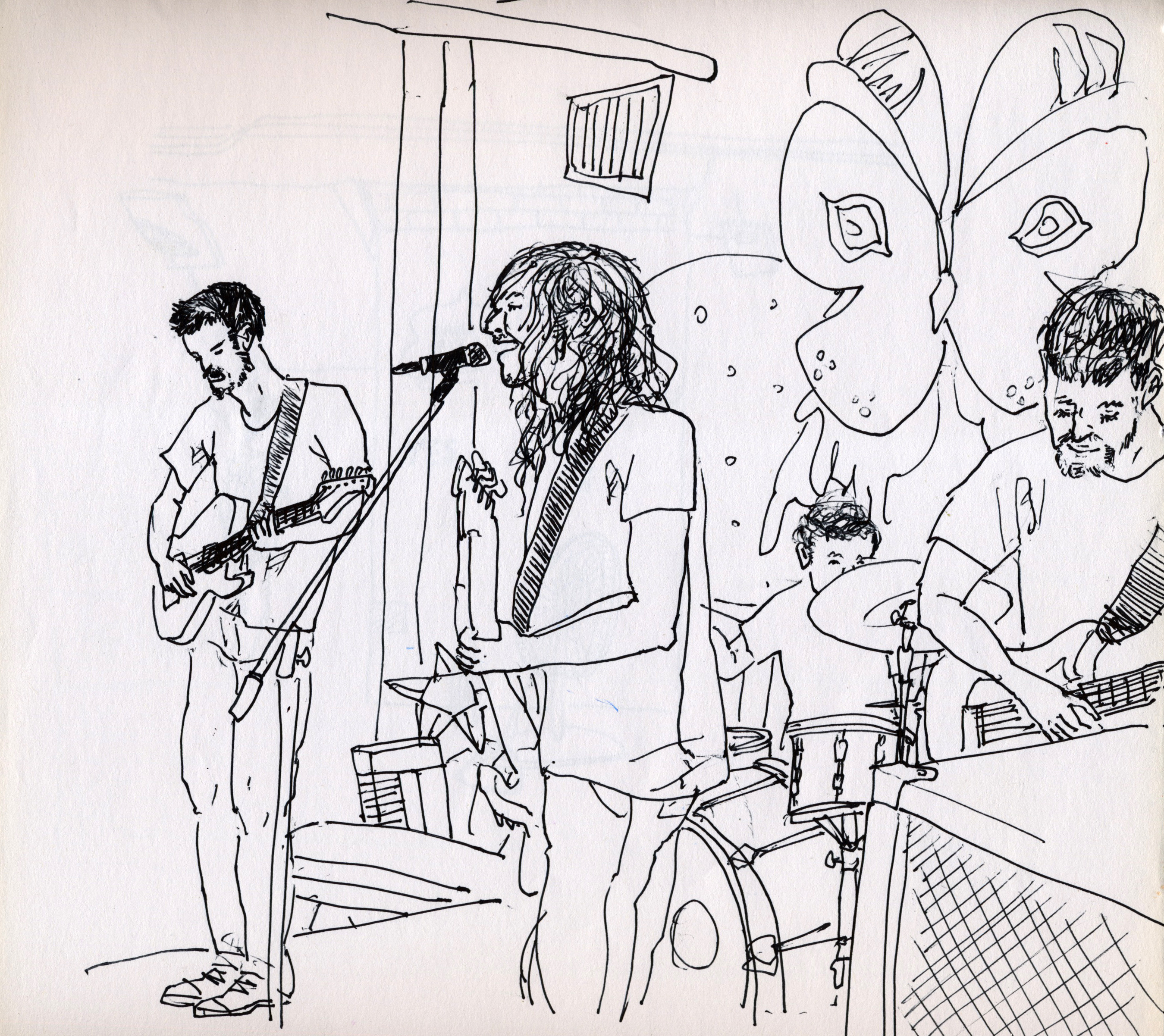
The Hotelier at The Shop in Worcester, MA, 8/17/14
Allston Pudding: I looked at some of your old interviews. And you said It Never Goes Out was your angsty youth album, and that Home, Like Noplace Is There was the dust that settles from youth in revolt. How does Goodness fit in?
Christian Holden: On Home, I feel like there’s this sort of big internal self-searching aspect, and self deconstruction of how we’re built and how we interact with each other, and if we can actually truly care for one another. And then Goodness is this record about how to relearn love for yourself in the world, and in the face of all this dark shit, kind of. It’s this record about losing love, in the sense that you think that love is something that exists forever. Or this idea that things can exist forever, then understanding that they don’t, in the same way that, maybe, you think that things last forever? Like, if there’s two people that are, in a thing, or if you have a job in your life, you’re not going to have that job forever, and for whatever reason that’s accepted. You’re like, “Oh I’m not going to have this job forever.” For some people that’s not necessarily true, and they do have that job forever. But when you’re in a relationship or a pairing with somebody in some sense, maybe you think that it is going to last forever, whether it’s a friendship or a relationship. Then, you sort of release that even in that mindset, you become two things that are deeply, or on the surface, incompatible. Then it doesn’t last forever in the way you think it does. But it’s sort of hippie shit but, the records just about finding love in a rhythm of the world sort of thing.
AP: Finding love in a hopeless place?
CH: That’s what they put [as the headline]!
AP: I know I saw that, and was like “What?”
CH: *laughing* So f*cking stupid.
AP: But you said that this your “love” album, in a sense.
CH: Yeah.
AP: And you said you felt like you couldn’t release something like that before.
CH: Sort of.
AP: Can you expand on that?
CH: I heard a friend recently talking about this other artist, and she was just like, “ I like their stuff but it’s mostly songs about girls. Like a lot of those songs are just girls names.” And I was like, “Oh, yeah.” And then, I mean, I just had to think about it. It’s sort of trope-y. Maybe it’s not necessarily a risk to do that, or maybe it is.
I feel like there are certain artists that get passes in certain worlds. But there’s a difference between a soul singer interacting with a love song, and the history of how soul singers interact with love songs, and the history of how pop punk singers interact with love songs. You’re always responding to the genre that you’re a part of, which is why certain bands can be really good in one genre but classified in a different genre, it’s junk. So, it’s love songs in response to being a pop punk band in a pop punk genre, (or, an emo band in an emo genre, however you want to classify us, ‘cause both are kind of the same). You have to build a body of work so that these songs are responding to that body of work, as opposed to just starting fresh and them having to respond to a specific style of music.
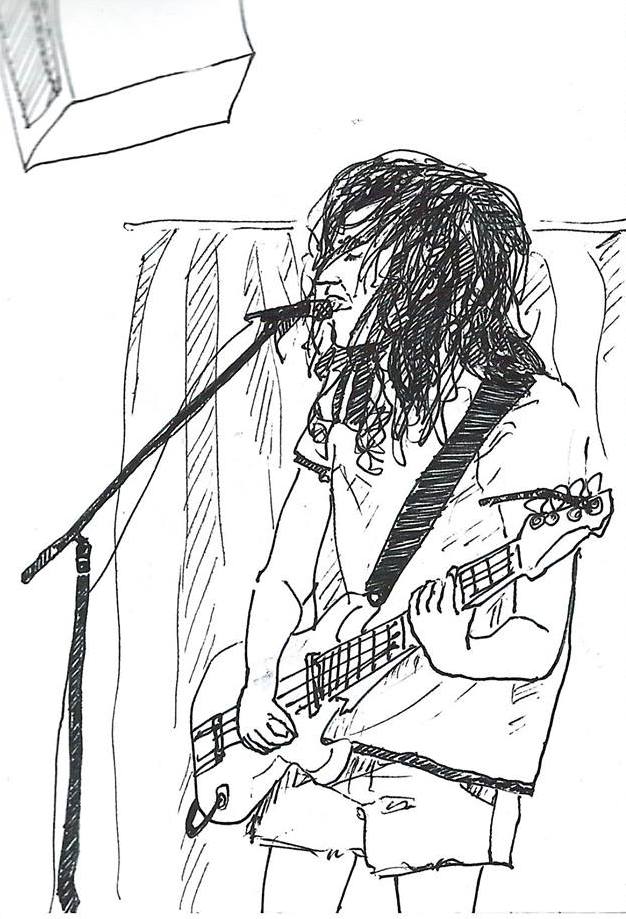
The Hotelier at The Middle East Upstairs in Cambridge, MA, 8/1/14
AP: Totally. Are there any lyrics that you were scared to write or release on this record?
CH: *nervous laugh* Not scared… I’ve never been scared to release a lyric.
AP: Then what?
CH: The writing with this record in general is less in the mode of certain songs on Home, where they aren’t really telling a story they’re just more freeform, lyrically. Almost every single song on this record is telling a story within itself and I’m more interested in seeing people’s interpretations to the songs because it lays it out for them more. Even though on our last record, “Housebroken” was a huge allegorical song and everyone thought “Oh, I just thought it was a song about a dog.”
AP: Oh, wow.
CH: But some people don’t have a literary background, don’t have that knowledge, or was never in a class that taught that, or never had a mind that picks it up. So that’s fine.
AP: You know, I had a friend in high school who used to interpret my dreams for me.
CH: I’ve had some bad dreams lately… Mostly because I have a fever every night. I’ve been sleeping with a sweatshirt on, I don’t know why. Probably because… Yeah.
AP: Hot and then cold?
CH: Yes then you’re no.
AP: I’m so sorry.
CH: That’s cool. But yeah, so there’s a lyric: “Fawn, doe, light snow, spots on brown of white make me believe that there’s a god sometimes.” I think that’ll be funny to just see what people think of that lyric. But nothing really relevant to this question.
AP: Does the new album use any images in the same way that Home used a suburban landscape to depict the overarching themes of the whole record?
CH: For sure. Well, while writing this record and when we were recording Home, I found myself sort of obsessed with getting natural sounds. Like, you know, we’re playing guitars into a computer and we’re doing a hell of a lot of editing to everything about it, so nothing’s really natural. And in the end, I thought it was funny. While other artists, especially in electronic music, are embracing the unnatural, how backwards and old-timey would we look if we’re just being, like, “Oh, the natural.”
Obviously, there is something really powerful about the feeling of naturalness. But then I got a field recorder, and I just started putting my headphones in. And I would just hold my field recorder, with my headphones in and like, turn it on, and it would just be all the same sounds that I’d be hearing already.
But for whatever reason, going through this machine, going through another machine, and going directly into my ears was really cool. So I had this idea of like, “What can I do to actually create the sound of nature on a record?” And a lot of it was just by using silence in certain ways. And if we’re talking about pop music, pop music is never really natural.
As much as I think John Zerzan is really goofy, I thought the idea was something interesting, especially since I’m making pop music, which works with the same chord progressions all the time, the same sense of harmony most of the time. It’s impossible to make it really natural, so I had to fuck with it because it was my thought. And to do that I started messing with prolonging sound over long stretches of time. If you take a class in pop, they’ll teach you the first chorus has to come within the first minute of the song. They have all these rules and stuff and so much of what we’re making is pop music, but we’re also trying to make the listener work for it, which is not something that you usually do in pop music. And messing with silence and messing with natural sounds and stuff was this whole coalescing of all these different thoughts that were going on in my head.
AP: Including some spoken word stuff that I really liked.
CH: Including some spoken word stuff, yeah, thanks.
AP: I thought it really worked. But I read that you wanted to do that on your last album, but you thought it would sound cheesy.
CH: It was cheesy.
AP: What changed for you?
CH: I think I got sort of ambitious with it on the last record. I made a bunch of interludes that were supposed to have spoken word, and supposed to tell a story over the whole record. It was actual story-telling, not like spoken word poetry stuff. And I was just doing it because I thought it would sound cool, and there was something about it that just didn’t work for me, and it didn’t feel that it was particularly good. And then I thought about it more after the record came out, and playing with bands who employed spoken word in their own stuff, and about what I wanted.
The whole idea comes from this camp I work at, called Not Back To School Camp for unschoolers and homeschoolers. It’s a camp in Vermont. Basically, it all came together full-force because there was this book called A Grateful Heart, it’s purple and yellow and has some fruit on the front. My mom used to, every night before dinner, she would read something from this book, in lieu of or next to praise. It was sort of like this prayer before we eat. So when I started working at this camp and the woman this camp, Grace Lou Ellen, (she’s like another maternal figure), also had this same book that she would open up before every meeting and read something from. And I was like, “Woah, this is wild.”
Just, the feeling that you get when someone is really bravely speaking. It demands your attention and grounds you in a way that when it’s covered up with music or if it’s shouted, I don’t think it does the same thing. ‘Cause when you’re shouting, you’re hiding, in a sense, and when there’s music you’re also sort of hiding. I think that bare voice, in a spoken tone, felt like it would set a good tone for beginning the record, or the tone that I wanted for the beginning of the record. It just fit into the record in that way.
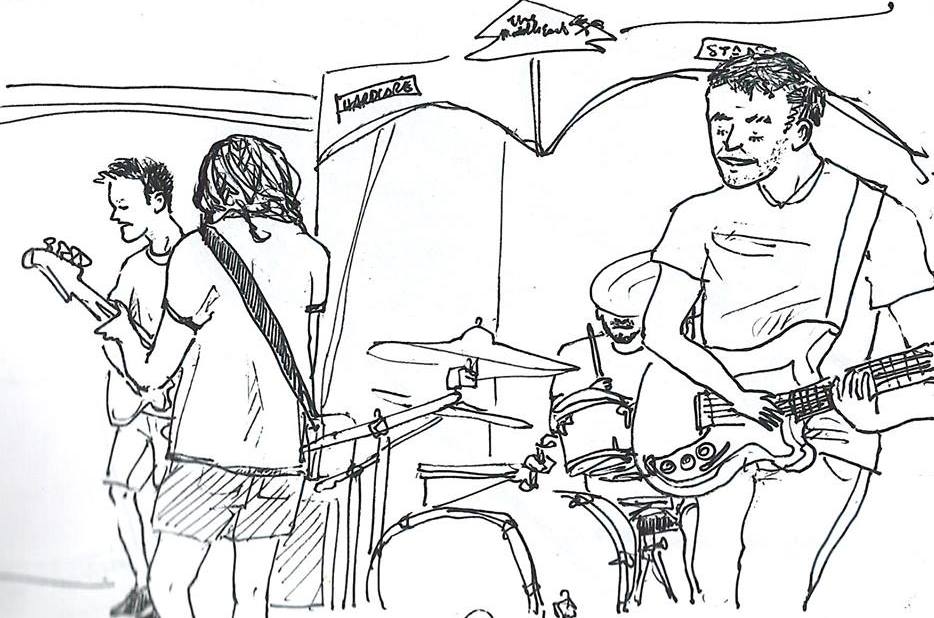
The Hotelier at The Middle East Upstairs in Cambridge, MA, 8/1/14
AP: Yeah I think it fits really well. I’m going to switch gears a little bit and ask you about actively making your shows a more inclusive space, which I think is awesome, especially for people who don’t identify as cis-dudes. So I just wanted to pick your brain for thoughts you’re having before tour, about any new ideas about actively making those spaces more inclusive?
CH: I’m sort of sitting back and watching what I think other artists are doing. PWR BTTM just said to have all the bathrooms at their shows be gender neutral. Speedy Ortiz did the hotline for like if someone is harassing you, which I think is really cool and is also more relevant to them because Sadie’s a woman, and probably all too familiar with that and specific scenarios at their own shows. So that’s two instances, one of which is a woman addressing her own situation as a woman at shows, another is a non-binary person addressing their own situation as being a non-binary person at a show.
Both cases in general are still very white. It’s just like a very culturally like white-dominated space, so I haven’t really seen anybody take a step, like as Speedy Ortiz took a step and how PWR BTTM took a step to address that sort of issue. And that’s only to say while these people are doing cool things, I’m trying to think of, observe, and not think that I can spearhead this thing to create safe spaces as a band of people who are mostly read as all straight men. Like no matter what we are, we are four assigned male at birth people on stage who sort of look and are not super, like I’m not super open about being queer, so like I’m going to be read as straight as default. So what I’m thinking is like I’m sort of just in this phase of seeing finding out how I can do it without setting a sort of authoritative tone at shows which is hard, but like you are sort of the most listened to voice in the room with you’re the person with a microphone. Just, literally. So then I’ve been thinking about ways in which we can conduct our sets that creates a certain tone in the room, and this is a performance thing as much as it is an activism thing or just like to me, it’s a performance thing that is can you create an atmosphere in which people are in this mindset and feel-good-set where they don’t wish to harm other people around them.
AP: Or at least have the the spacial awareness.
CH: Yeah and to appreciate the people next to them, appreciate that they’re all in this room together, appreciate that they’re all witnessing this.
So I think about not wanting to be an authoritative force, and think about the ways artists interact with being a public figure and how being a politicalized public figure as well as– I’m a musician, I’m an artist, I make a living off this, I’m technically a business. How much posing in this way of creating safer spaces is like being a gay oreo, you know? If you know what I mean? Like how much that is building trust without doing the actual work.
I’m thinking about probably how I can take a more active role and right now I’m experimenting with straight performance and creating this understanding that these unwritten rules of if this happens, it’s not going to be tolerated. These certain behaviors that we’re all interacting with, you don’t do that here. And I don’t want to have this reactionary vibe where we’re in this room and we’re combatting this “thing.” I think that the idea of active combating patriarchy is valid and good. I don’t think that me trying to take an alternative style is to say the other doesn’t work as well. Not being unintentional about it, keeping it as an intention. But also I’m just experimenting. I can’t feel like I can do too much as a person read as straight male.
AP: I think what you’re doing is working so far, and is a process, and not going to change overnight. You know, people think of the Hotelier and then they also associate that agenda with the band. Which is cool for punk.
How did you decide to tour with Told Slant?
CH: Oh! So the first show we ever played with Told Slant was right when our record came out two years ago. We played in New York together and the room was so packed that I couldn’t see their set, but I had already listened to them a bunch and thought they were really cool.
AP: That’s a little what it was like when I saw them the first time at Mid East Up. I could just hear their voice and I was crying in the back in the corner, it was great.
CH: Yeah, there was something about, I mean as a queer person in this scene, I sort of was just like 1) interested in being their friend and befriending more queer musicians at the time because I didn’t feel like I had any other queer musicians that I was seeing as peers. And then also not wanting to see them get sort of, used. Like, as music is becoming a more economically viable genre, bands are making more money and we’re able to be engulfed by the industry more. I didn’t want to see this band that I thought was making cool shit get sucked into this thing. So I befriended a bunch of those peeps, giving them this rundown of “be really careful.” Like, I had already figured out the industry.
AP: We got a band mom over here.
CH: Yeah. I had already figured out a bunch of industry stuff on my own just by signing to a label that sucked, and also touring with industry people who I thought were kind of rude and didn’t care about your shit, and like wanting to just share some knowledge real quick so that I could catch people up, so then we had talked about doing a tour together and they seemed like excited about it. We were supposed to do it in the fall. That didn’t work out. Me, Felix and Noelle from Loone are all buds and so the tour of us, Loone, and Told Slant was in the plan for happening for a little bit. Now, Loone has a new split record, Told Slant has a new record coming out, Bellows has a new record coming out, we have a new record coming out. So it just made the most sense to do it now.
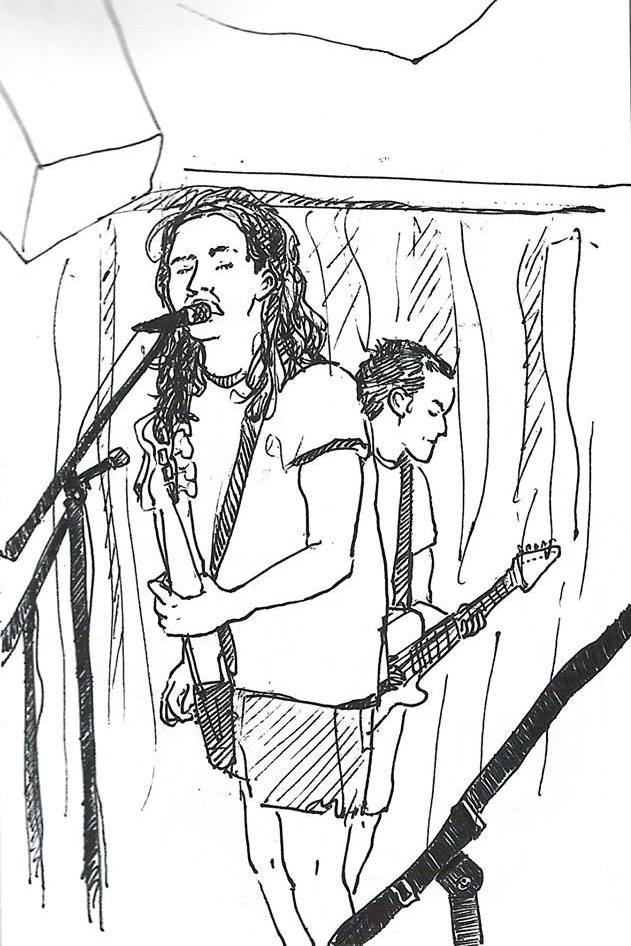
The Hotelier at The Middle East Upstairs in Cambridge, MA, 8/1/14
AP: Frick yeah. I’ve heard you talk about the intensity at which people care for the Hotelier, which is a lot, and that’s pretty obvious by everyone singing along with all the wordy lyrics. And if people are singing the lyrics, they’re also digesting and caring about the them, and I’m wondering, then, what does that say about music without lyrics, or wordless music?
CH: Good question. I don’t think that shoving the most words into a song that you can is the most impressive or effective way that you can communicate stuff to a listener, as you can tell by how this interview’s been going, that’s just sort of how I do things. It’s like a little bit more grey.
At least on Home, we’re using these structures that aren’t necessarily evoking emotion, and if they are they’re doing it really subtly by a switch between a really hectic part to a really pretty chorus. We have to rely on words more to get a point across or to evoke certain emotion more. Instrumental music belongs to the listener more, because like you were saying there are people who have intense connections with music with no lyrics and I think that has to be completely personal. The interaction with it is very personal. It can be whatever your mind is imagining.
AP: That can also be said about songs with really wordy lyrics. But there’s always, I feel, that you’re always trying to picture it through someone else’s eyes if you’re hearing their voice. Maybe poems could be different.
CH: Another cooler example or an example that is this middle ground–I talk about this record a lot so I feel like this person’s going to think that I’m just obsessed with them or something. But Katie Dey, she’s an artist from Australia, put out this record called asdfasdf I think. And there’s no lyrics for the record, and she sort-of pitch-shifts her voice up a couple octaves or something, or fucks with her voice until it is inaudible sort of, and she doesn’t have any lyrics on her site so all these songs are, there are words being said and they’re sort of a rhythm but you just don’t know what she’s actually saying. It’s not like lyrics. You can sort of make out what she’s saying, but sort of in itself is like a blank canvas. I feel like there was something else I listened to recently that felt that way. Oh it was one of the Swedish band that we were playing. It felt like some of the lyrics were in English but some of them weren’t and I was like trying to make it out, sometimes I could sometimes I couldn’t. And it’s sort of creates this blank canvas effect where the listener can create images in their own mind and instead I am saying specific imagery that you can envision. It’s just two different things I think.
The Hotelier’s album, Goodness, (streaming below) comes out today, May 27th, via Tiny Engines. You can also catch them Thursday July 14th with Told Slant, Bellows, and Loone at The Sinclair. Tickets are available here.
